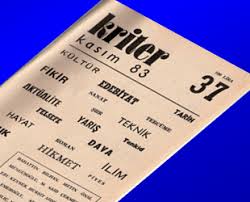| |
| |
|
| |
|
| |
|
Duyurular |
|
AKIL IÇIN YOL BIRDIR
(THERE IS but
ONE WAY for REASON)

(linkleri SAG TIKLAYIN lütfen)
Sn.Soner YALÇIN'dan dikkate değer bir yazı: Edebiyatla Ahmaklaştırma https://www.sozcu.com.tr/ 2021/yazarlar/soner-yalcin /edebiyatla-ahmaklastirma -6335565/
Önerdigimiz sayfalar:
M. SAID ÇEKMEG?L
anisina
|
|
|
|
|
Anasayfa
|
|
Yazar Administrator
|
|
21-03-2006 |
 Geopolitical Diary: The Beginning of the End Game Geopolitical Diary: The Beginning of the End Game
March 17, 2006 0300 GMT
It appears that the United States and Iran are now going to begin public talks on Iraq. The Iranian News Agency reported Thursday that Ali Larijani, secretary of Iran's Supreme National Security Council, told a closed session of the Majlis that Iran had agreed to a request by the Supreme Council for Islamic Revolution in Iraq to negotiate with Washington on Iraq. Also on Thursday, White House spokesman Scott McClellan said the United States is open to holding talks with Iran about Iraq. He emphasized that such talks must be confined to Iraq and not involve nuclear issues.
Barring one tremendous coincidence, the near-simultaneous announcements from Washington and Tehran clearly mean that there have been prior consultations. We long have felt that such back-channel conversations were under way. Indeed, it would be incredible if they weren't. The United States and Iran both have deep interests in Iraq, some of which coincide and some of which collide. The two countries have a history of secret diplomacy dating back to the birth of the Islamic Republic. Clearly, they have been talking and now have decided to make the talks public.
The White House emphasized that nuclear weapons would not be discussed, making it appear that it was Washington that was taking this off the table. The nuclear issue, however, is off the table because it is not the point. Iraq is and always was the key issue between the United States and Iran; nuclear weapons have been an Iranian lever to get Washington to take it more seriously. That has clearly happened.
If there is ever going to be an end game in Iraq, we are now in it. Operation Swarmer, launched Thursday, seemed designed to attack jihadists in the Sunni regions. The key to the U.S.-Sunni conversation has been getting the Sunnis into the political process and, as a result, getting the Sunnis to help liquidate the jihadists. If Swarmer was launched on the basis of Sunni intelligence, and if that intelligence turns out to be accurate, it will be a key event in recent Iraqi history. Those are big "ifs," of course. At the same time, if the Sunnis are joining the political process, then it is time for Iran to negotiate its final price on Iraq, and that appears now to be happening. Taken together, this is not the end, but the beginning of the end game, and success is not guaranteed.
The Iranians want a pro-Tehran government in Iraq. If the Sunnis are in the mix, that is not going to happen. The fallback, and essential position of Iran, is that Iraq should be completely neutral. This will hinge not only on the shape of the Baghdad government, but on certain guarantees concerning the size and armament of the Iraqi military. The last thing Tehran wants is the resurrection of a massive Iraqi military force that could threaten Iran, under a government in which Shiite domination is not permanently guaranteed.
The United States wants to build an Iraqi army to fight the jihadists. That's fine with the Iranians, but in their view that military force must be calibrated so that it is sufficient for internal missions and insufficient to threaten Iran. Whatever the structure of Iraq's new government, no one can guarantee its future. But there can be controls over the types of equipment the Iraqis can acquire. So the United States will want enough for counterinsurgency operations and will happily accept limitations on the military's size so that it cannot threaten Iran.
On the other hand, the United States -- prodded by Saudi Arabia -- does want the force to be large enough to limit Iran's ability to invade and dominate Iraq. Washington wants the balance of power in the region to re-establish itself. At the same time, the United States wants to make certain that the Iraqi government is not simply and unilaterally in the hands of the Shia, and that Sunni and Kurdish interests are protected.
If those things are achieved, then the nuclear issue will be mooted on both sides. But what is easy to write is more difficult to negotiate. Can and will the Sunnis turn on the jihadists? Can there be agreement on the size of the Iraqi military that will satisfy both Iranian concerns and American needs? How can these agreements be enforced over the long haul? Will the Iranians see President George W. Bush's political weakness as too great for credibility? Will the Americans trust that the Iranian negotiators are not setting them up? Endless questions arise.
Whether agreement can be reached is not clear. Only the basic issue is now clear. Nuclear weapons, democracy in Iraq and all the other peripheral issues will now take a backseat to the core issue: The future of Iraq being negotiated by Washington and Tehran, with the Iraqi parties arraying themselves around these discussions.
http://www.stratfor.com/products/premium/iraqcommap.phpSadece kayıtlı kullanıcılar yorum yazabilirler.
Lütfen hesabınıza giriş yapınız veya kayıt olunuz. Powered by AkoComment 2.0! |
|
Son Güncelleme ( 08-11-2007 )
|
|
|
|
|
|
|
Kullanıcı Girişi |
| L O G I N |  |
|---|
|
|
Ziyaretçi Sayısı |
|
148906460 Ziyaretçi
|
|
|
|